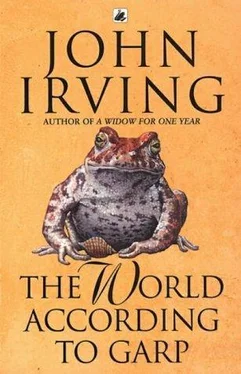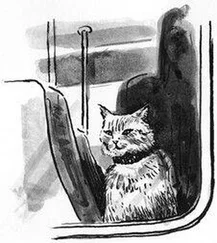“That bear makes the customers come !” said the man on his hands.
“It makes some people come, it turns some away,” said the dream man. He was suddenly somber, as if his profundity had depressed him.
But we had been so taken up with the antics of the Circus Szolnok that we had neglected old Johanna. When my mother saw that Grandmother was quietly crying, she told me to bring the car around.
“It's been too much for her,” my father whispered to Theobald. The Circus Szolnok looked ashamed of themselves.
Outside on the sidewalk the bear pedaled up to me and handed me the keys; the car was parked at the curb. “Not everyone likes to be given the keys in that fashion,” Herr Theobald told his sister.
“Oh, I thought he'd rather like it,” she said, rumpling my hair. She was as appealing as a barmaid, which is to say that she was more appealing at night; in the daylight I could see that she was older than her brother, and older than her husbands too—and in time, I imagined, she would cease being lover and sister to them, respectively, and become a mother to them all. She was already a mother to the bear.
“Come over here,” she said to him. He pedaled listlessly in place on his unicycle, holding on to a parking meter for support. He licked the little glass face of the meter. She tugged his leash. He stared at her. She tugged again. Insolently, the bear began to pedal—first one way, then the next. It was as if he took interest, seeing that he had an audience. He began to show off.
“Don't try anything,” the sister said to him, but the bear pedaled faster and faster, going forward, going backward, angling sharply and veering among the parking meters; the sister had to let go of the leash. “Duna, stop it!” she cried, but the bear was out of control. He let the wheel roll too close to the curb and the unicycle pitched him hard into the fender of a parked car. He sat on the sidewalk with the unicycle beside him; you could tell that he hadn't injured himself but he looked very embarrassed and nobody laughed. “Oh, Duna,” the sister said, scoldingly, but she went over and crouched beside him at the curb. “Duna, Duna,” she reproved him, gently. He shook his big head; he would not look at her. There was some saliva strung on the fur near his mouth and she wiped this away with her hand. He pushed her hand away with his paw.
“Come back again!” cried Herr Theobald, miserably, as we got into our car.
Mother sat in the car with her eyes closed and her fingers massaging her temples; this way she seemed to hear nothing we said. She claimed it was her only defense against traveling with such a contentious family.
I did not want to report on the usual business concerning the care of the car, but I saw that Father was trying to maintain order and calm; he had the giant pad spread on his lap as if we'd just completed a routine investigation. “What does the gauge tell us?” he asked.
“Someone put thirty-five kilometers on it,” I said.
“That terrible bear has been in here,” Grandmother said. “There are hairs from the beast on the back seat, and I can smell him.”
“I don't smell anything,” Father said.
“And the perfume of that gypsy in the turban,” Grandmother said. “It is hovering near the ceiling of the car.” Father and I sniffed. Mother continued to massage her temples.
On the floor by the brake and clutch pedals I saw several of the mint-green toothpicks that the Hungarian singer was in the habit of wearing like a scar at the corner of his mouth. I didn't mention them. It was enough to imagine them all—out on the town, in our car. The singing driver, the man, on his hands beside him—waving out the window with his feet. And in back, separating the dream man from his former wife—his great head brushing the upholstered roof, his mauling paws relaxed in his large lap—the old bear slouched like a benign drunk.
“Those poor people,” Mother said, her eyes still closed.
“Liars and criminals,” Grandmother said. “Mystics and refugees and broken-down animals.”
“They were trying hard,” Father said, “but they weren't coming up with the prizes.”
“Better off in a zoo,” said Grandmother.
“I had a good time,” Robo said.
“It's hard to break out of Class C,” I said.
“They have fallen post Z,” said old Johanna. “They have disappeared from the human alphabet.”
“I think this calls for a letter,” Mother said.
But Father raised his hand—as if he were going to bless us—and we were quiet. He was writing in the giant pad and wished to be undisturbed. His face was stern. I knew that Grandmother felt confident of his verdict. Mother knew it was useless to argue. Robo was already bored. I steered us off through the tiny streets; I took Spiegelgasse to Lobkowitzplatz. Spiegelgasse is so narrow that you can see the reflection of your own car in the windows of the shops you pass, and I felt our movement through Vienna was superimposed(like that)—like a trick with a movie camera, as if we made a fairy-tale journey through a toy city.
When Grandmother was asleep in the car, Mother said, “I don't suppose that in this case a change in the classification will matter very much, one way or another.”
“No,” Father said, “not much at all.” He was right about that, though it would be years until I saw the Pension Grillparzer again.
When Grandmother died, rather suddenly and in her sleep, Mother announced that she was tired of traveling. The real reason, however, was that she began to find herself plagued by Grandmothers dream. “The horses are so thin,” she told me, once. “I mean, I always knew they would be thin, but not this thin. And the soldiers—I knew they were miserable,” she said, “but not that miserable.”
Father resigned from the Tourist Bureau and found a job with a local detective agency specializing in hotels and department stores. It was a satisfactory job for him, though he refused to work durinq the Christmas season—when, he said, some people ought to be allowed to steal a little.
My parents seemed to me to relax as they got older, and I really felt they were fairly happy near the end. I know that the strength of Grandmother's dream was dimmed by the real world, and specifically by what happened to Robo. He went to a private school and was well liked there, but he was killed by a homemade bomb in his first year at the university. He was not even “political.” In his last letter to my parents he wrote: “The self-seriousness of the radical factions among the students is much overrated. And the food is execrable.” Then Robo went to his history class, and his classroom was blown apart.
It was after my parents died that I gave up smoking and took up traveling again. I took my second wife back to the Pension Grillparzer. With my first wife, I never got as far as Vienna.
The Grillparzer had not kept Father's B rating very long, and it had fallen from the ratings altogether by the time I returned to it. Herr Theobald's sister was in charge of the place. Gone was her tort appeal and in its place was the sexless cynicism of some maiden aunts. She was shapeless and her hair was dyed a sort of bronze, so that her head resembled one of those copper scouring pads that you use on a pot. She did not remember me and was suspicious of my questions. Because I appeared to know so much about her past associates, she probably knew I was with the police.
The Hungarian singer had gone away—another woman thrilled by his voice. The dream man had been taken away —to an institution. His own dreams had turned to nightmares and he'd awakened the pension each night with his horrifying howls. His removal from the seedy premises, said Herr Theobald's sister, was almost simultaneous with the loss of the Grillparzer's B rating.
Читать дальше












